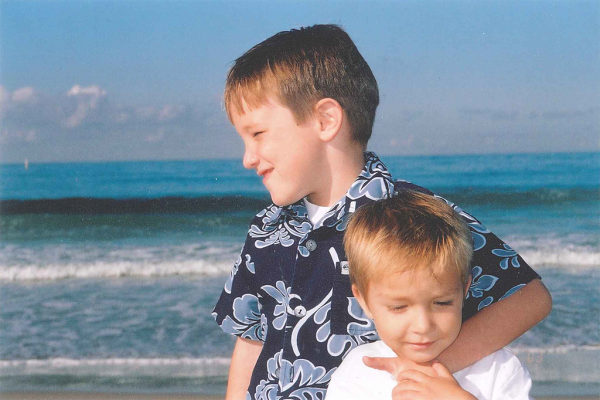For My Brother: Lessons from Kenyon

As my junior year at Kenyon begins in earnest, I think of my little brother, Collin. There were a few years, back when I was 10 or so and he around seven, when our parents weren’t around much and I had to take care of him. He was so little (not that I was much bigger) and when I look at him I still so clearly see his face as it was then. But while he’s still my younger brother, he’s no longer my little guy. In fact, he’s just sent out his college applications. Where’d the time go? How do I prepare him for what’s to come? Heck, I barely know what I’m doing.
When I think of him evaluating his options for schooling, looking through brochures and going on tours, I can transport myself back to when he was just starting high school, and I was visiting colleges. He visited Kenyon, too, but unfortunately he won’t be joining me on the Hill. However, I still think he could benefit from the things that brought me here.
Kenyon had exactly what I wanted — accessible faculty and earnest living in an intentional community of die-hard readers — but he has different priorities. He’s always been the varsity athlete, the popular one (I, the bookworm, admire him for this), and while I’ve been able to accept that he wants a big school and its attendant bustle, I do still think he can use three of the greatest lessons I’ve learned from my liberal arts education and some of the educators to whom it has exposed me.
This letter is more or less what I’d write. I could call, of course, but in letters I can pontificate without being interrupted — which is, of course, a delight for me and annoying for him. And that makes the format even better.
Dear Collin,
As you head off to college, I want to give you some advice. Doing so unsolicitedly, along with the later bedtime, is one of the few privileges of being the older brother. So please indulge me.
First, you’ve got to read. Read as much as you can. This means not ‘as much as your schedule seems to allow,’ but rather, ‘make room in your schedule.’ One of the best decisions I’ve made in college has been to read not only the material assigned for class but also to read for pleasure. This year, I’ve managed around a book per week (I keep track on Goodreads, if you’d like to make a sibling rivalry of it). I propose to you that reading is the single most important thing to do in college, the only period in modern American life when one has the time to read voraciously.
On that point, my second suggestion: make good use of free time. In ancient Athens, citizens devoted time to develop their virtue. They thought constantly about nobility and goodness, and to what they aspired. That’s why when you read Homer or even Aristotle, they speak a language of traits we don’t emphasize anymore, like courage, magnificence and nobility. The liberal arts college confronts the modern person with those ancient ideals, and only in a college environment is there really time to think hard about how those high human qualities can still apply to modern life. Read widely, question your assumptions, and use this formative time to set yourself up for real happiness.
Third, and this is key for a happy life, learn to live within yourself rather than in the eyes of others. Rousseau draws a distinction between two kinds of self-love, one healthy and one corrosive. As we usually live, we think constantly of how others see us, and so we’re jealous and insecure; instead, try to live with a confident self-regard. Basically, be yourself and know yourself. It sounds trite, but it’s actually pretty difficult, especially difficult as you enter a new environment for the first time and must navigate new relationships. You’ll inevitably wonder where you stand, even as you change more and in different ways than you may expect. So take time to be a friend to yourself. Find a quiet spot, and bring a book, or your homework, to just be for a while. As I think back about myself when I first got to Kenyon and contrast him with who I am now, I know that I was wrong then about who I was and what I thought I wanted. Reading and reflecting helped more than anything else, and that clarity is invaluable when choosing what to do after these four years.
Finally, to help with all this, you’ve got to call your brother. You’re going to meet hundreds of new people and make dozens of new friends; but these friends will at first feel more distant and your relationships with them will feel more unsure than those you developed over years back home. This is inevitable, and sometimes you’ll feel alone. You won’t be the only one; as my counselor here says, “don’t compare your insides to others’ outsides.”
The most important thing I learned by moving so far away was how much I love those I return to when I come home. That’s why I’m so excited that I’ll see you this Thanksgiving.
